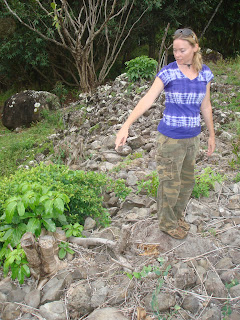Women
and men in BYU-Hawaii were invited to expand their views of women‘s roles and capabilities
in a panel discussion sponsored by David O. McKay Center for Intercultural
Understanding on Nov 15.
Project lead of
the event, Andrea Hansen, a senior in psychology from Colorado, said the purpose of the event was
to “dispel the harmful and prevalent notion that women must objectify
themselves sexually and allow others to objectify them sexually to be
successful.”
Attracting more
than 60 attendees, successful women from the community were invited to share
their stories and examples. Speakers including Napua Baker, the first female
and first known Polynesian to have an administrative position in CES, Debbie
Hippolite Wright, BYU-H Vice President for Student Development & Services, Lara
Leimana Fonoimoana, former Mrs. America, and Lindsey Pierce, BYU-H alumni,
community member and stay-at-home mother.
Students were
actively engaged in asking questions regarding current gender issues. Topics
included: women receiving higher education, models to overcome objectification and
stereotypes of women, maintaining balance between family, education, and work,
and advice to males on helping female friends avoid the various mass media
traps, etc.
Based on her
recent experience serving as a missionary in the LDS Family History Library,
Baker said, “It is the mission of BYU-H to establish peace internationally. Education
is a powerful tool the Lord gives us. Your gender shouldn’t stop you. Look at Sister
Wright, she is the only woman among 4 men [BYU-H presidency]….. I always
remember I am a child of God. If you feel you are doing something right, speak
out but don’t hold back. Again, with Heavenly Father and the Holy Ghost, you
can always move forward.”
Making students
laugh, Wright said her secret in finding balance in life was to “marry well.” She
said women who have higher education and higher administrative positions
occasionally find limitations in a male-dominated work force; however, Wright
commented, “I do feel blessed to work with respectful people. I never feel
excluded from any meeting or conversation.”
Wright explained
spiritual achievement is as great as secular achievement. Despite all her
secular achievements, Wright still commented, “The best part [of being a woman]
is being with my children and grandbabies.”
“Pretty girls
come and go, only the women who have a wonderful package inside stay and live
the legacy,” said Fonoimoana. She shared her first-hand experience as the
former Mrs. Hawaii and Mrs. America, and
how she stood up for her principles. “It is interesting to see [how] women
portray themselves based on looks. Officially the prettiest girl wins [the
pageant]."
Fonoimoana said, "Being a public figure and a mom, I need to draw a fine line. But one
thing I did realize, I got the opportunity to be the example to young girls and
to talk to young women groups to offer what I believe as a good model. Beauty,
no matter what, starts inside. If you don’t get that right, it can’t shine
outside. But it is hard when children see magazines and TV, they learn how they
should act and how they are supposed to look.”
Encouraging men
to support their female friends in fighting objectification, Fonoimoana said, “I
think both men and women have this issue. At the end of day it doesn’t matter….
It is important to be healthy, not only physically but mentally.” She added, “What
you are taught at home, you stick to it. Don’t let any man or woman to tell you
to change it.”
Like other stay-at-home
mothers, Pierce pays attention to how mass media influences her children. “When
I look at Desperate Housewives [TV
soap drama], I see how media portrays women and children. Even when my boys
pass by a clothes store, they asked why the girls have no clothes on. Media is
affecting my kids….. For girls it gives false impressions, for boys it gives false
hope. I can see how divorce rates are so high and pornography is so high even
affecting the church. I can’t just keep them [my children] home all the time.
My responsibility is to teach them what is good and right, and then let them
decide for themselves.”
Jennifer
Kajiyama, discussion moderator and political science professor, shared a story when
she was in BYU. “I was pulled aside one day when I was in grad. school. A man
told me he was upset the school ‘took you but not me. I am a priesthood holder
and I have a good family.’ I wondered why I was here [to seek higher
education]. I wasn’t going to let their labels and visions set who I am. I
don’t need to fit the stereotype of theirs. A lot of wonderful leaders in the
church said whenever women choose to go to grad. school or to have family, it
is important to know your vision.”
“As
a man, I certainly understand why guys are attracted by girls that are not
modest,” said Aaron Coffey, one of the male attendees in the activity and also a
communication junior from Georgia.
“If you dress immodest, you would get more attention from guys but not the
right guys that you are looking for. The problem is that, you need to find an
alternative way to get guys’ attention in an edifying way.” He said he found
women attractive if they are outgoing, have a sense of humor, good hobbies, and
ambitions.
Marcus
Costantino, a business sophomore from Utah,
advised women who discredit themselves for the purpose to please men to “remember
you are a daughter of God. Any dream you have is worth pursuing. There is no
need to limit yourself.” He said “As a man, we should encourage women to pursue
their goals and never stop growing.”
 Single students in BYU-Hawaii have the option to have a quick and easy meal full of protein to celebrate the day.
Single students in BYU-Hawaii have the option to have a quick and easy meal full of protein to celebrate the day. 













